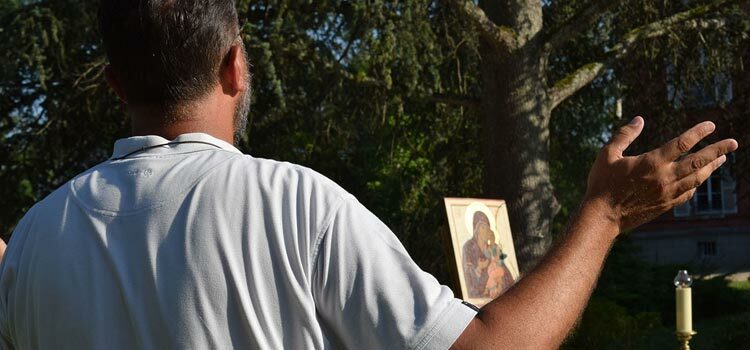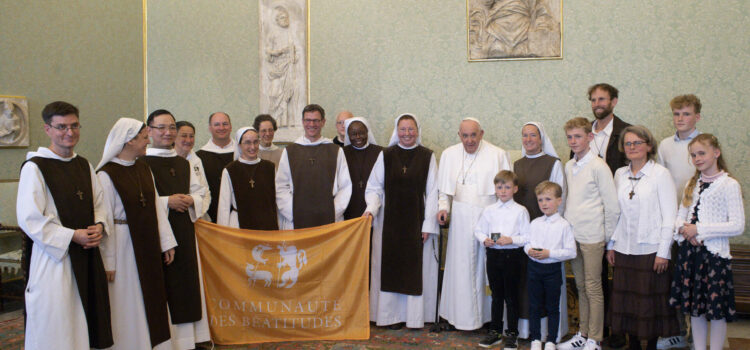In the beginning
In the beginning is the Word: God speaks and it is. The Word creates, organises what was formless wasteland, the word gives life. And the fruit of the Word of God is so good, ever so good (Gen.1). The Word is infinitely good. Through it, God’s love expresses itself, materializes, and gives itself.
The human word is an instrument of communion in love; it remains deeply wounded by the original sin. It can become a lie, it can divide, condemn, destroy, kill.
Likewise, silence can bring about communion in love, hand in hand with a sick or dying person; silence is often an expression of communion and compassion, stronger than any word. Two lovers, hand in hand, manifest their love to one another more through silence than with words. But then, such silences would be the fruit of a word which has been spoken, and would express a deep attention to one another. Our silences bear also the wound of sin. They can mean « unsaid things », they can mean unconcern, contempt, self-confinement, anger, closed fists. Silence can break communion (in a couple for instance) as it can cause death.
Necessary purification
Word and silence, in our human relationships and in our spiritual life as well, have to be purified and to support each other. Silence, according to God, is not a lack of words, it is beyond words.
A good silence is, first of all, a capacity to listen. Listening to God in order to let him call, teach, lead and love. Listening to the other, in order to give him all the space he requires. Listening
to the depth of our heart in inner silence, to discern beyond our passions.
It is not unusual for us to speak, even with beautiful words, in order not to listen to the other (for instance Lc.11, 27-28). Even our liturgies can go astray if, ignoring the commandment « Listen Israel » (Deut. 6, 4) they do not give enough room for real silences to listen and adore.
Some will have a tendency to flee or to break silence, all the time, out of fear of finding themselves alone, face to face with themselves. A good silence is also a sign of autonomy and of respect for the other person, for what he is going through. Others will find it difficult to speak, because they are afraid to express themselves (to expose their nakedness) in front of others.
Listening and answering
So, silence enables us to listen, yet one has to listen to – to meet – another person beyond his words, listen to him more with the heart than with the head. In the Eucharist, after the Gospel has been proclaimed, the priest or the deacon says, « Let us praise the Word of God » and we answer « Praise to you, Lord Jesus ».
We praise the Lord first, because He comes to meet us in his Word. Only then do we meditate and welcome the specific Word He has given us that day. We have to receive this Word, not on a reasoning level, always ready to debate, to enter into arguments, very often to defend ourselves, but with the heart of a disciple who allows himself to be taught and shaped by the Word, in the likeness of the Virgin Mary who kept and meditated all those words and
events in her heart. Our way of listening, our silence, our words, have to become humble and chaste, learning from the Virgin Mary. If our silence is listening first, our word must first be an
answer. Not a reaction to the word of the other, but an answer in which the depth of heart is invested.
Silence and orison
Of course, silence is the most precious and the most difficult element to live out in orison. It is a good thing to start our time of orison gazing at the Virgin Mary, so we may welcome God’s visitation. Then, we can enter into prayer with a verse of the Word (a psalm for instance); it is not the moment for meditation but for communion, hand in hand with the Lord. We can also whisper a nigun or a song in tongues, a kind of expression halfway between words and silence, because they stand beyond our reasoning and help us to descend into our heart. Then, during all our time of orison, the prayer of the heart will help us to remain humbly in the presence of God, in the depth of our heart. During this time, our thoughts do not stop going around in circles: everyday worries, a word or behavior that has wounded us, an old wound or an old dream flaring up, sometimes-haunting thoughts of despondency or vainglory, sometimesdarker thoughts (jealousy, murmurs, and so on). Must we try to silence those thoughts? Would it not be better to let them flow simply into God’s heart without dwelling on them?
Learning from Mary
Let us behold Mary and John at the foot of the Cross. They stand there, looking up to Christ; their heart is torn by what they behold. They do not rebel. They do not interfere. They allow God to act for the salvation of the whole world, even if they cannot understand everything at that moment in time. They are fully disciples. They keep and meditate in the depth of their heart what they behold. Behind them, they hear the crowd yelling : insults, blasphemies, cries of hatred where all human despair and revolt are expressed.
They hear but they do not listen. They let all that flow in the heart of God. Mary allows the sword of those words to open her heart and she allows all that to flow into Christ’s heart, soon to be pierced. That is how we must stand in front of Christ, in adoration, to surrender to him in silence, all that is living within us and the yells of the world we commit to his care. John, who has seen the heart of Christ opened by the spear, when seeing the open grave, believes that God has not held anything against us and that his Salvation is victorious.
Quotation
«Everything that is great and creative is shaped with silence» Cardinal Sarah
|
Peter’s testimony From the word to silence and from silence to the word. Amongst the apostles Simon Peter is often the first to speak, sometimes enlightened by the Holy Spirit, sometimes standing in the way of God’s plans (cf. Mt, 16 13-23), and even when he does not know what to say (cf. Mc 9, 6). But after his triple denial, when he meets Jesus’s eyes, Peter does not say anything, he cries bitterly. Looking at the empty grave, and on Easter evening, when Christ appears to the apostles, he says nothing. Some days later, on the shore of the lake of Tiberiade (cf. John 21) when John says to him « It is the Lord », he does not argue, he throws himself into the water. Near the fire, he says nothing; it is Jesus who begins to speak, questioning him. Then, he can say at last, the only word Jesus was waiting for « You know I love you. »This long time of silence was needed where so many memories have tilled the heart of Peter, so he can say, at last, this true word… |
To go furthur…Only for today:
Books:
|
Find the previous articles in our “Life of prayer” series.
(publication edited by brothers and sisters of the Community of the Beatitudes – © rights reserved).






